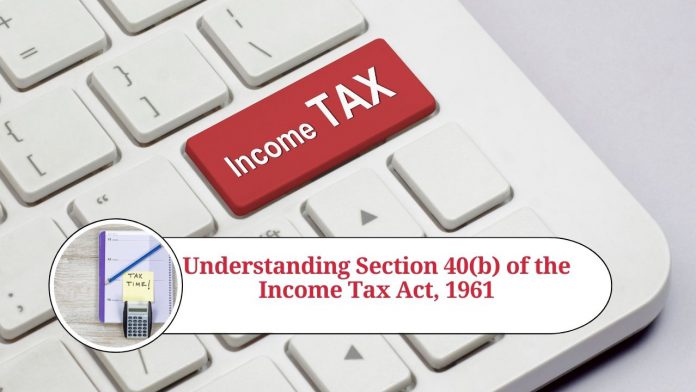Section 40(b) of the Income Tax Act, 1961, deals with the deduction of remuneration paid to partners of a firm. It specifies the conditions that need to be satisfied for such deductions and the maximum amount of remuneration that can be paid to a partner.
Conditions for the Deduction of Remuneration:
According to Section 40(b), the following conditions need to be satisfied for the deduction of remuneration paid to partners of a firm:
a) The payment should be made to a working partner of the firm. A working partner is a partner who is actively engaged in the conduct of the firm’s business.
b) The payment should be authorized by, and by, the terms of the partnership deed.
c) The payment should not be excessive, having regard to the legitimate business needs of the firm and the benefit derived by or accruing to it therefrom.
d) The payment should not be like a personal payment to the partner and should not be contingent on, or vary with, the profits of the firm.
If any of these conditions are not satisfied, the deduction claimed shall be disallowed and added back to the income of the firm.
Maximum Remuneration Payable to Partners:
Section 40(b) specifies that the maximum amount of remuneration that can be paid to a partner is limited to the amounts specified in the partnership deed or to the amount of remuneration permissible under the section, whichever is lower. This means that the partnership deed can specify a lower amount of remuneration than the one permissible under the section, and in that case, the lower amount will be applicable.
Treatment of Excess Remuneration:
If the remuneration paid to a partner exceeds the limits specified in the partnership deed or under the section, the excess amount will be disallowed and added back to the income of the firm. However, if the excess payment is made to a partner who is a working partner but not a major partner, the excess amount can be treated as a payment to a third party and claimed as a deduction in the hands of the firm.
Final Conclusion:
In conclusion, Section 40(b) provides for the deduction of remuneration paid to work partners of a firm subject to certain conditions. The maximum amount of such remuneration is limited by the terms of the partnership deed or by the provisions of the section. If the conditions are not satisfied, the deduction claimed will be disallowed and added back to the income of the firm. It is, therefore, important for firms to ensure that the remuneration paid to their partners complies with the provisions of Section 40(b) to avoid any adverse tax consequences.
Understanding Section 40(b) of the Income Tax Act, 1961: Conditions for the Deduction of Remuneration Paid to Partners of a Firm
Read more useful content:
- section 145 of income tax act
- section 10e of income tax act
- section 9 of the income tax act
- section 94b of income tax act
- section 206aa of income tax act
Faqs
Q: What is Section 40(b) of the Income Tax Act, 1961?
A: Section 40(b) of the Income Tax Act, 1961 deals with the deduction of remuneration paid to partners of a firm. It specifies the conditions that need to be satisfied for such deductions and the maximum amount of remuneration that can be paid to a partner.
Q: Who can receive remuneration under Section 40(b)?
A: Only working partners of a firm can receive remuneration under Section 40(b). A working partner is a partner who is actively engaged in the conduct of the firm’s business.
Q: What are the conditions for the deduction of remuneration under Section 40(b)?
A: The conditions for the deduction of remuneration under Section 40(b) are as follows:
The payment should be made to a working partner of the firm.
The payment should be authorized by, and by, the terms of the partnership deed.
The payment should not be excessive, having regard to the legitimate business needs of the firm and the benefit derived by or accruing to it therefrom.
The payment should not be like a personal payment to the partner and should not be contingent on, or vary with, the profits of the firm.
Q: What is the maximum remuneration that can be paid to a partner under Section 40(b)?
A: The maximum remuneration that can be paid to a partner under Section 40(b) is limited to the amounts specified in the partnership deed or to the amount of remuneration permissible under the section, whichever is lower.
Q: What happens if the remuneration paid to a partner exceeds the limits specified under Section 40(b)?
A: If the remuneration paid to a partner exceeds the limits specified under Section 40(b), the excess amount will be disallowed and added back to the income of the firm. However, if the excess payment is made to a partner who is a working partner but not a major partner, the excess amount can be treated as a payment to a third party and claimed as a deduction in the hands of the firm.
Q: Can remuneration be paid to sleeping partners under Section 40(b)?
A: No, remuneration cannot be paid to sleeping partners under Section 40(b). The section applies only to payments made to working partners, i.e., partners who are actively engaged in the conduct of the firm’s business.
Q: How can firms ensure compliance with Section 40(b)?
A: Firms can ensure compliance with Section 40(b) by ensuring that the remuneration paid to their partners complies with the conditions specified under the section. They should also ensure that the maximum amount of remuneration payable to partners is specified in the partnership deed and does not exceed the limits specified under the section.




















